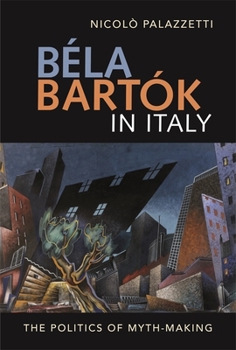Béla Bartók in Italy: The Politics of Myth-Making
Examines the reputation of the Hungarian musician B la Bart k (1881-1945) as an antifascist hero. This book examines the reputation of the Hungarian composer B la Bart k (1881-1945) as an antifascist hero and beacon of freedom. Following Bartok's reception in Italy from the early twentieth century, through Mussolini's fascist regime, and into the early Cold War, Palazzetti explores the connexions between music, politics and diplomacy. The wider context of this study also offers glimpses into broader themes such as fascist cultural policies, cultural resistance, and the ambivalent political usage of modernist music. The book argues that the 'Bart kian Wave' occurring in Italy after the Second World War was the result of the fusion of the Bart k myth as the 'musician of freedom' and the Cold War narrative of an Italian national regeneration. Italian-Hungarian diplomatic cooperation during the interwar period had supported Bartok's success in Italy. But, in spite of their political alliance, the cultural policies by Europe's leading fascist regimes started to diverge over the years: many composers proscribed in Nazi Germany were increasingly performed in fascist Italy. In the early 1940s, the now exiled composer came to represent one of the symbols of the anti-Nazi cultural resistance in Italy and was canonised as 'the musician of freedom'. Exile and death had transformed Bart k into a martyr, just as the Resistenza and the catastrophe of war had redeemed post-war Italy.
Format:Hardcover
Language:English
ISBN:1783276207
ISBN13:9781783276202
Release Date:August 2021
Publisher:Boydell Press
Length:320 Pages
Weight:1.40 lbs.
Dimensions:1.0" x 6.0" x 9.1"
Customer Reviews
0 rating





